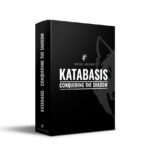How To Disrupt Any Addiction Jungian Style
Disrupt Addiction
22.03.24
Here’s a simple and effective framework to disrupt any addiction – This method helped me drop 25kg (55 lbs) and keep it off.
The framework I’m about to share is not the only way of understanding addictions, however, it’s one I’ve gotten great results with, for me and my clients.
An addiction, like food, alcohol, or s*x, is usually formed as a way to cope with an unbearable emotion.
In my case, I felt like there was something inherently wrong with me.
The unbearable emotion I was trying to avoid was shame.
Because I didn’t have the proper resources to understand and deal with this feeling at the time, I unconsciously started looking for something to alleviate it.
Well, let’s just say that a pint of ice cream became my best friend at these moments.
Food gave me comfort and a weird sense of control, as long as I was eating, nothing bad could happen.
At first, there’s some kind of conscious decision to avoid the feeling and look for that fix.
Over time, you get completely disconnected from that primary emotion, and you only notice the craving.
Now, you find yourself stuck in an endless loop.
You don’t even know what’s causing it in the first place, and you become a hostage to those cravings and compulsive behaviors.
So how can we fix that?
The most immediate thing that can be done is to find another way to regulate your emotions and detox your system.
To me, going to the gym was a life savior.
This is not surprising since every addiction makes you disconnect from your body and disengage from reality.
You’re never present and you live fighting demons in your head.
That’s why regaining connection with your body and experiencing being fully present with your senses is imperative.
The Solution
Some people need to spend some time in that first step before addressing the root cause, while others can do it concomitantly.
Simply put, we have to learn how to tolerate that primary repressed emotion.
I recommend doing this with a therapist since it’s something that can engulf you if you’re not careful.
Building this tolerance will involve fully being with this uncomfortable emotion and talking about it instead of avoiding it.
Slowly, we learn how to be present and stop disengaging from reality.
Over time, the compulsiveness fades and this new awareness allows us to choose to do differently, and we finally become the creators of our audacious lives.
Lastly, addictions usually have their root cause in an unresolved mother and father complex.
You can find an in-depth guide about it here.
The Numinosum
I could’ve stopped in the second step, however, I decided to add a deeper layer to this theme.
Ultimately, addictions replace our sense of meaning and purpose, in other words, they secretly become our gods.
It’s something inescapable and we religiously devote all our time, resources, and energy to it.
Metaphorically, we’re constantly giving our blood as the ultimate sacrifice to keep our addictions alive.
We pay with our lives.
I know, let that sink in.
In Jungian Psychology, we work with the notion of the numinosum, that is, symbolically speaking, what is the god of a person and what ultimately structures their psyche.
For some, their god is work and money, while for others food, alcohol, a relationship, or s*x.
Astonishingly, some people elect their traumas to be their gods and live their whole lives dedicated to recreating their own suffering.
Less drastically, even something generally considered good like running and exercise can be wildly compulsive.
The problem is that when we don’t consciously and deliberately seek to create our individual sense of meaning, it’ll usually come in the form of a compulsion or addiction.
Crazy enough, even if it’s something destructive it gives us a sense of control, and life appears to have at least some meaning.
That’s why, ultimately, to free ourselves from any addiction we must diligently work to give space for the numinosum in our lives, craft our own values, and conceive our unique sense of meaning.
This is something Jung calls the symbol formation process (there’s a whole chapter dedicated to it in my free book).
To me, it was a combination of deeply connecting with my body through the gym and yoga, fully devoting myself to music, and steering my work to what feels purposeful.
In a single sentence, reconnecting with and following my soul.
Read more about that here – The Numinosum – How To Find Meaning
Rafael Krüger – Live an Audacious Life
Start your journey with Katabasis – The Shadow Integration Manual
